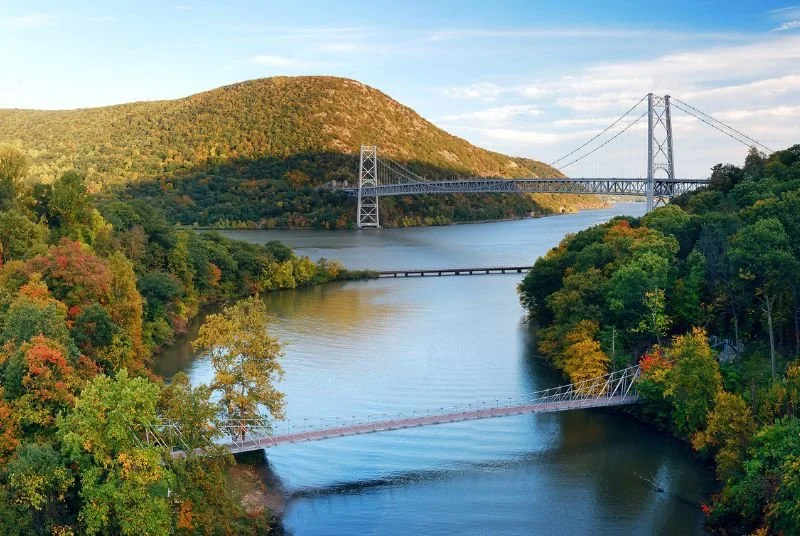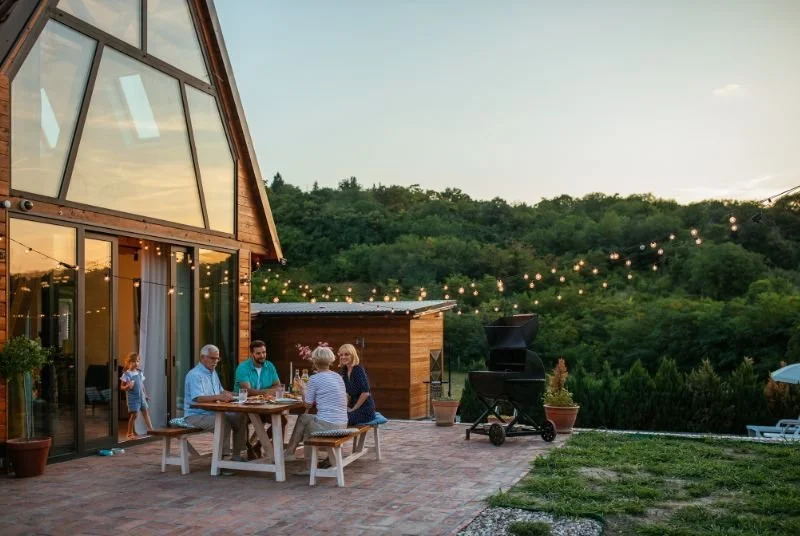Best Countryside Venues for Corporate Team Offsites & Retreats
Countryside team offsite venues offer the space, fresh air, and authentic connection that city boardrooms simply can't match. Whether you're looking to strengthen remote-team bonds or give your leadership crew a strategic retreat without the noise, rural venues provide the perfect backdrop for real conversations and genuine human connection.
The challenge? Finding that ideal countryside location that actually fits your team's needs, budget, and vibe. The Offsite Co. has organized retreats for 400+ companies, building relationships with premier venues across urban and rural landscapes around the world while developing expertise in matching team dynamics to environments that drive outcomes.
Why Countryside Venues Win for Team Offsites
Before diving into specific options, let's talk about why rural retreats resonate so strongly. As Henry David Thoreau observed, "We need the tonic of wildness...At the same time that we are earnest to explore and learn all things, we require that all things be mysterious and unexplorable. We can never have enough of nature." His insight holds up remarkably well.
Research cited by McKinsey, drawing on environmental psychology studies and longitudinal research, shows that teams retreating to natural settings report significantly higher engagement levels and stronger interpersonal connections than those meeting in urban environments. There's neuroscience behind it—exposure to nature reduces stress and increases cognitive function, meaning your team will actually think more clearly during strategic sessions.
Geographic Sweet Spots for US Countryside Offsites
Northeast: Hudson Valley, New York Dramatically underrated for corporate retreats, this region offers vintage estates, thriving farm culture, and artsy communities—all just 90 minutes from New York City.
Properties range from historic estates to boutique farm retreats. Provides countryside ambiance and authentic connection without venturing far. Growing retreat infrastructure and vendor partnerships. Budget-friendly compared to California alternatives for similar quality.
New England: Stowe/Stoweflake, Vermont Rolling mountains, forest scenery, and classic New England charm define this region.
Stoweflake Mountain Resort & Spa — 134 guest rooms, 15,000 sq ft of meeting space, farm-to-table dining, and a full spa — offers a curated retreat experience with everything from meditation sessions to dog sledding in winter. Professional team coordinators customize itineraries for groups of any size. Perfect for leadership teams seeking reflection, wellness-focused retreats, and companies wanting authentic Vermont culture (Ben & Jerry's sampling, local glassblowing studios). Centrally located with easy access to outdoor activities year-round. Close proximity to local tastemakers and artisan producers.
Midwest: Wisconsin Dells, Wisconsin Nestled in 80 acres of pine forest, Sundara Inn & Spa combines wellness, creativity, and sustainability.
The property features 44 guest suites (adults-only), 2,800 sq ft of customizable meeting space, heated infinity pool, Chakra Meditation trails, and curated wellness programming. Perfect for leadership teams seeking reflection and renewal. Budget-friendly compared to coastal alternatives, and centrally located for Midwest-based companies.
West Coast: Napa/Sonoma, California Rolling vineyards, world-class hospitality, and farm-to-table culture define this region.
The flagship venue is Carneros Resort & Spa — 76 ultra-modern cottages, 28 acres of vineyards, 35,000 sq ft of event space, and on-site farm-to-table dining. Perfect for leadership retreats and companies wanting to position themselves as forward-thinking. Easily accessible from San Francisco (90 minutes). Generally more budget-friendly than East Coast alternatives for similar quality.
Southeast: Charleston/Lowcountry, South Carolina Historic charm, genuine Southern hospitality, culinary excellence, and coastal beauty define this iconic Southeast destination.
Wild Dunes Resort — an island resort with beaches, two 18-hole golf courses, spa, and flexible event spaces for up to 250 guests — offers both luxury and accessibility. Excellent for heritage-focused retreats and companies wanting to weave culture and connection into their offsite experience. Easy accessibility with strong vendor partnerships for activities and catering. Rich cultural experiences and world-class Lowcountry cuisine
What to Look for in a Countryside Offsite Venue
Finding the right rural venue means balancing several factors. We consider these essentials pre-requisite to any booking:
Accessibility & Location: How far is it from major transportation hubs? Can your team get there without a three-hour odyssey? We typically recommend venues within 90 minutes of an airport or major city, so people can arrive refreshed rather than exhausted. Look for properties with on-site parking or shuttle arrangements—logistical friction kills momentum fast.
Accommodation Quality: Don't assume countryside equals basic. Modern rural retreats offer private rooms, en-suite bathrooms, quality bedding, and reliable WiFi. If you're hosting remote teams, strong internet isn't a nice-to-have—it's essential. Check that the venue can handle your full team's bandwidth needs, especially if people need to step away for client calls.
Meeting & Activity Spaces: You need dedicated rooms for focused work sessions, breakout spaces for smaller groups, and outdoor areas for activities. The best countryside venues offer flexibility—a main hall that can be divided into smaller rooms, outdoor pavilions for weather-protected activities, and spaces that transition smoothly from formal meetings to casual hangouts.
Catering Capabilities: Rural venues should either have in-house catering or established relationships with local providers. Countryside locations can't rely on food delivery apps. Confirm they can accommodate dietary restrictions and preferences, and that meal quality matches your company culture.
How The Offsite Co. Approaches Countryside Retreat Planning
Countryside retreats require different planning considerations than urban offsites. Based on organizing hundreds of rural retreats, here's what actually matters:
Site validation matters more in rural locations. Photos don't reveal WiFi dead zones, kitchen limitations, or accessibility issues that can derail countryside retreats. The Offsite Co. conducts technical site visits including actual bandwidth tests, walking meeting spaces to identify acoustic issues, and reviewing backup plans for weather-dependent activities.
For a recent Wisconsin retreat, our site visit revealed the venue's "high-speed internet" couldn't handle 40 simultaneous Zoom connections—we negotiated a temporary bandwidth upgrade before the client ever knew there was an issue.
Design agendas around the environment, not despite it. The biggest mistake companies make: transporting their standard conference agenda to a countryside setting and wondering why it feels flat.
Effective countryside retreats integrate the landscape into programming. The Offsite Co. works with facilitators who specialize in nature-integrated formats—walking strategy sessions, outdoor breakout discussions, reflection time built into the schedule rather than treated as "downtime."
Research from Stanford University demonstrates that walking dramatically boosts creative thinking. In a study published in the Journal of Experimental Psychology: Learning, Memory, and Cognition, researchers found that participants who walked—whether on a treadmill or outdoors—generated 60% more creative responses on average compared to those who remained seated. Walking outdoors produced the most novel and highest-quality ideas, though even treadmill walking in a windowless room showed significant creative gains.
Seasonal strategy: Off-peak months deliver 25-35% cost savings. April, late October, and November offer the best value-to-experience ratio for countryside retreats. You'll avoid summer/fall crowds, secure better rates, and often receive complimentary upgrades.
We can design programming around winter: morning strategy sessions with fireplace views, afternoon snowshoeing that became the trip's highlight, and evening discussions in a heated outdoor pavilion under string lights.
Build arrival and departure transitions. The shift from daily operations to retreat mindset doesn't happen instantly. We design 2-3 hour arrival windows with light activities—property tours, informal lunch, casual icebreakers—before formal programming begins.
The Bottom Line
Teams that move between focused strategy work in sophisticated urban or estate spaces and restorative activity in genuinely different environments generate measurably different outcomes. It's not about aesthetics. It's practical: environmental contrast produces different thinking patterns. Melbourne's compressed radius makes this rotation logistically feasible when other cities don't.
The Offsite Co. has organized countryside retreats for 400+ companies. We've seen what happens when teams leave the environments that constrain them—fragmented groups become unified, leadership teams find genuine alignment, remote workers who've never met become genuinely connected colleagues. Natural settings don't just provide a pleasant backdrop. They fundamentally change how people collaborate.
Ready to plan your countryside retreat? Get a free proposal from The Offsite Co. and discover how we handle everything from venue sourcing to activity coordination.
FAQ: Countryside Team Offsite Venues
How far in advance should we book a countryside venue?
Aim for 3–4 months ahead, especially for peak season (May–September). Popular venues book 6+ months in advance. Winter and shoulder seasons offer more flexibility. The Offsite Co. maintains relationships with venue sales teams who alert us to cancellations and last-minute availability, often securing "sold out" venues for clients through these partnerships.
What's the typical cost per person for a countryside offsite?
Budget $150–600+ per person per night depending on venue type, location, and season. This typically includes accommodation and meals; activities and specialized services cost extra. Farm stays and converted barns tend toward the lower end ($150-280); historic estates and luxury country hotels toward the upper end ($320-600+). The Offsite Co.'s vendor relationships consistently secure 15-20% cost savings compared to direct bookings.
Can countryside venues accommodate remote workers who need to stay connected?
Yes, but verify WiFi capabilities beforehand. Modern countryside venues invest in robust internet, but speeds and reliability vary. The Offsite Co. conducts technical site visits including actual bandwidth tests in all meeting spaces and guest rooms, reviewing backup internet systems, and confirming capacity for full group usage. We've prevented countless connectivity disasters through this diligence.
What size teams do countryside venues typically accommodate?
Most accommodate 15–100+ people. Smaller, more intimate venues (farm stays, boutique properties) might cap at 20–40; large country estates and resorts handle 150+. The Offsite Co.'s curated portfolio includes options across the spectrum, with expertise in matching group size to venue personality and infrastructure.
Are countryside venues suitable for winter offsites?
Absolutely, especially in Vermont and mountain regions where winter landscapes are stunning. Just plan activities around weather—indoor workshops, cozy fireside sessions, snowshoeing, or heated outdoor pavilions. The Offsite Co. designs winter programming that embraces the season intentionally. One financial services team initially resisted February Vermont: post-retreat surveys showed 94% said winter "enhanced rather than hindered" the experience.
What if we have team members with mobility issues?
Check accessibility carefully. Historic estates may have limitations (stairs, uneven grounds, limited accessible features). Converted barns and purpose-built country hotels typically offer better accessibility. The Offsite Co. always asks specifically about ground conditions, accessibility features, and ADA compliance during site visits, ensuring venues can accommodate all team members comfortably.
How do we keep the agenda engaging at a countryside venue?
The location itself is part of engagement. Mix formal sessions with outdoor time, informal meals, and activities that leverage the natural environment. Research from Stanford University shows walking boosts creative output by 60% compared to seated discussions. The Offsite Co. works with facilitators who specialize in nature-integrated formats—walking meetings, outdoor reflection time, and activities that use the countryside as a thinking tool.
Can we do team-building activities at countryside venues?
Most offer or partner with providers for activities like outdoor challenges, cooking classes, hiking, clay pigeon shooting, or local cultural experiences. The Offsite Co. maintains relationships with activity providers throughout our venue regions, enabling rapid customization and weather backup plans. We coordinate everything from wine blending workshops in Napa to glassblowing experiences in Vermont.
What's the best region for a first countryside offsite?
Hudson Valley or Charleston offer the easiest logistics (90 minutes from major cities), established venue infrastructure, and reliable amenities. Vermont and Napa/Sonoma provide more dramatic experiences with strong retreat infrastructure. The Offsite Co. helps match region to company culture, budget, and team preferences—first-time countryside retreats require different considerations than organizations with established offsite programs.
How do we handle transportation to a countryside venue?
Most venues offer on-site parking; some provide shuttle services from nearby towns or airports. For larger groups, The Offsite Co. coordinates charter coaches or private shuttles. We build in 30–60 minutes of travel buffer before first sessions—arrival and settling-in time is important for the transition to retreat mindset.



